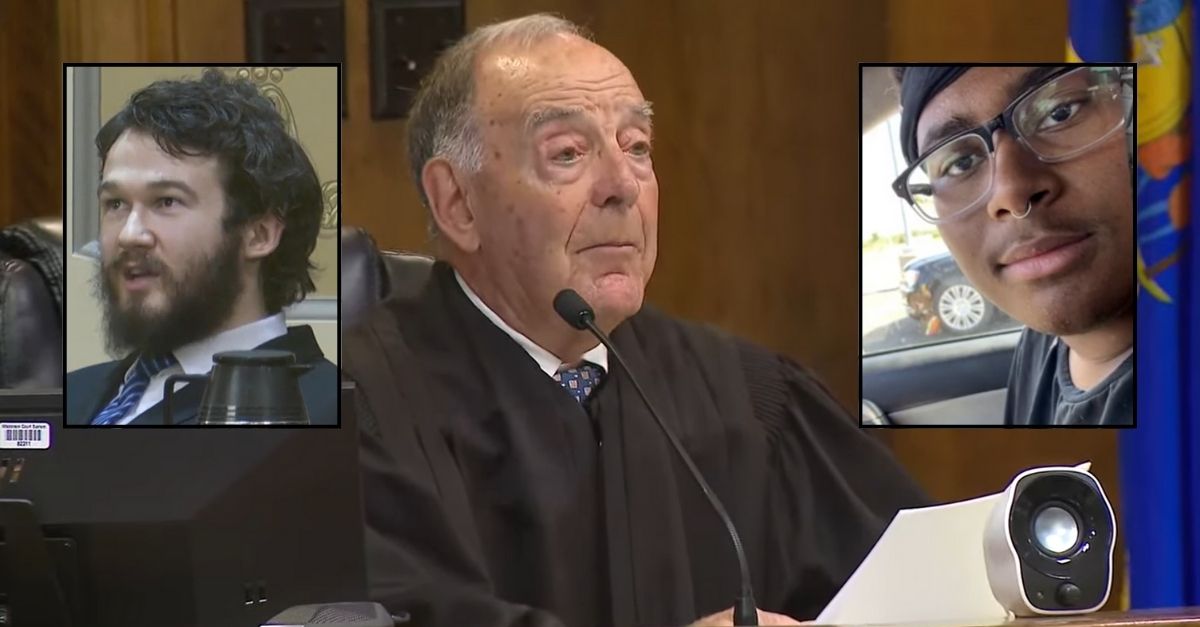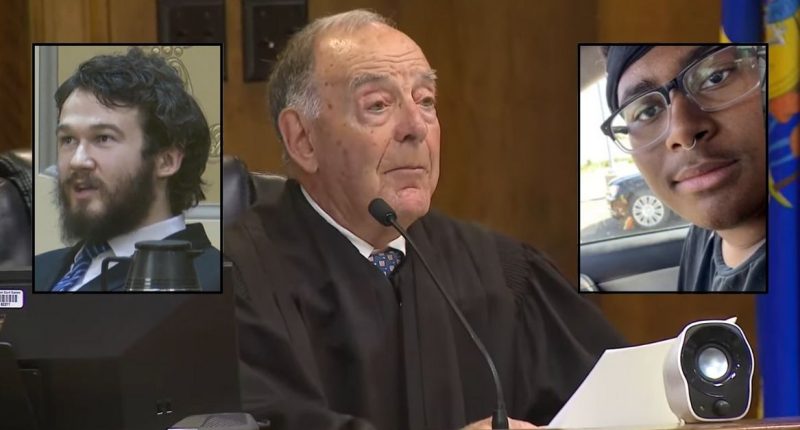
Background: Courtroom video of Judge Donald Zuidmulder during Jackson Vogel”s sentencing hearing (WLUK). Inset (left): Jackson Vogel during his murder trial (WBAY). Inset (right): Micah Laureano (Randle-Dable-Brisk Funeral Home).
A Wisconsin man who strangled his cellmate asked a judge to consider supervised release after he was convicted of a hate crime — but the judge was not open to his request.
Jackson Vogel, 25, had already been serving a 20-year prison sentence at Green Bay Correctional Institution for the attempted murder of his mother, a crime he committed when he was 16. Eight years after the beginning of his incarceration, he was assigned a cellmate, 19-year-old Micah Laureano. Laureano had been sentenced to three years for assault and vehicle theft.
According to court records obtained by the Green Bay Press Gazette, Vogel killed Laureano within hours of his arrival.
Love true crime? Sign up for our newsletter, The Law&Crime Docket, to get the latest real-life crime stories delivered right to your inbox.
Investigators stated that after the murder, Vogel was smiling. According to court records, Vogel said he killed Laureano because he was “bored,” and because he was Black. Vogel also believed Laureano was gay, and he told investigators that his victim “checked all the boxes.”
Vogel was convicted of Laureano’s murder in June following a trial during which he was the only witness presented by his defense. He appeared in court for his sentencing on Friday. The Green Bay Press Gazette was in the courtroom and reported that Vogel’s defense attorney, Luke Harrison, asked Brown County Circuit Court Judge Donald Zuidmulder to consider the possibility that Vogel’s attitude could change.
Harrison said, “I believe that giving Mr. Vogel an opportunity to be released to extended supervision at some time in the future speaks to that possibility that people can change, that change does take an extremely long period of time sometimes, but that it is possible.”
Vogel also spoke on his own behalf, explaining that he “may not show remorse,” adding, “I may not be able to understand emotion. I may not be able to understand remorse itself. That doesn’t mean a person cannot be sorry for what they did at any point in time. ‘Cause I am sorry.”
As he finished his statement, Vogel also asked that he have the opportunity for supervised release in the future.
As Zuidmulder pointed out, a first-degree murder conviction in Wisconsin carries a mandatory life sentence. A judge has the discretion whether or not the convicted person may or may not be eligible for supervised release at some point. When it came to Vogel, Zuidmulder was not feeling generous.
The judge prefaced his sentencing by addressing Vogel directly, saying “You set in motion all the things that bring us here today.”
Zuidmulder then referred to a “chilling” note written by Vogel that was presented as evidence during his murder trial. The note said, “Kill all humans,” as well as a directive to kill Black people and gay people using graphic slurs.
“Mr. Vogel, at 16, you were sent into the Wisconsin State Correctional System,” he said. “Eight years later, you commit a crime in which an anonymous human being, to whom you had no real relationship, is placed with you in a cell. And in very short order, you process the decision to kill him. You kill him in an opportunity where you basically garrote him with a clothesline. Your testimony and your statement, you put your knee up against him, and you pulled him back until he went limp. You literally squeezed the life out of him.”
The judge called Vogel’s “excited” demeanor after the murder “frightening.”
He concluded by telling Vogel, “I believe you’re a killing machine. I believe that after eight years in the state prison system, there’s been no change. And therefore, I have no ability to have an expectation that you will ever change.”
Vogel was sentenced to life in prison without the possibility of supervised release.




